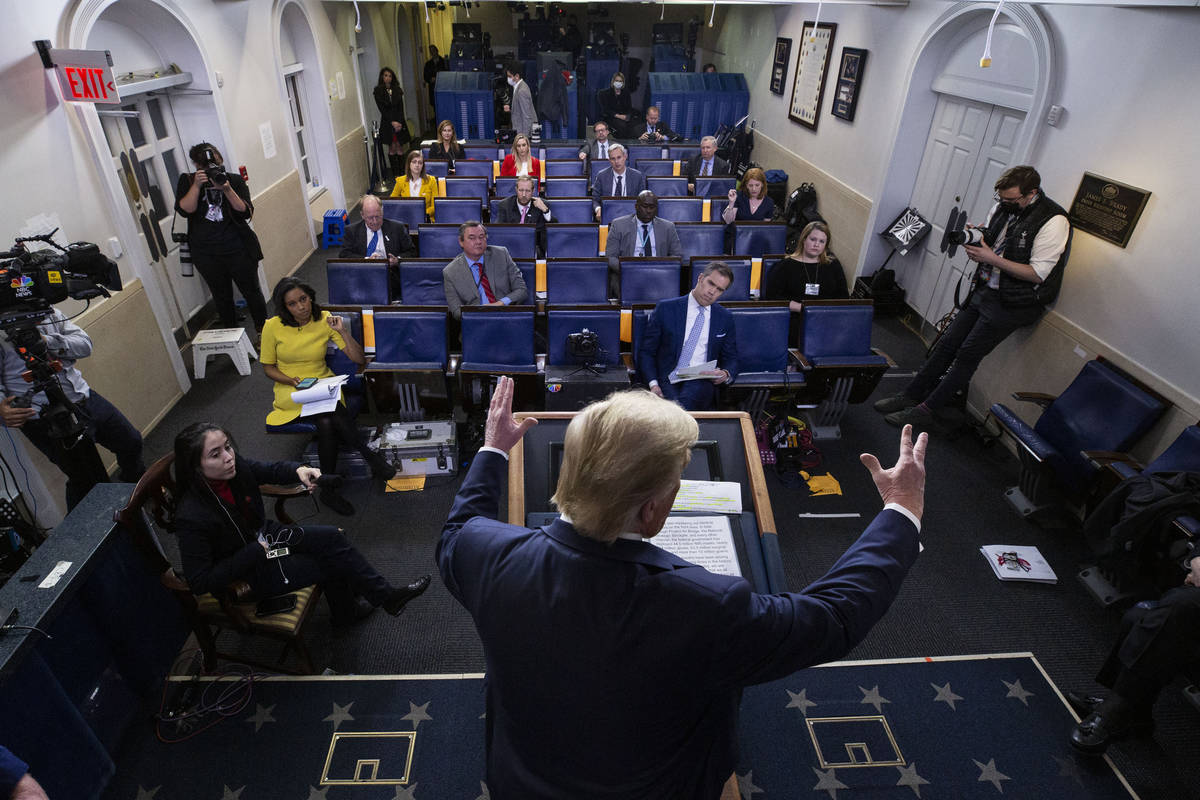Trump taps business leaders for advice on reopening
WASHINGTON — On the one hand, American businesses want to get back to work.
On the other hand, many CEOs fear lifting stay-at-home policies could result in a surge of coronavirus infections and hospitalizations — a double whammy that could deliver a body blow to an already tottering economy.
These are the concerns President Donald Trump has sought to balance with his creation of “Great American Economic Revival Industry Groups” — a consortium of some 200 fellow big shots, including Dallas Mavericks owner Mark Cuban, JP Morgan Chase CEO Jamie Dimon, Las Vegas Sands CEO Sheldon Adelson and conservative economist Steve Moore.
Trump has given governors a green light to lift stay-at-home orders after a decline in infections over 14 days, a recommendation meant to dampen new surges after low-infection states such as Alaska loosen mitigation measures. It is a risky but perhaps essential strategy given a lack of vaccines and a shortage of diagnostic tests.
For that reason, Trump’s team of informal advisers have different views on what the government and states should do and when, much like the nation’s governors.
Their disagreements may not be as pronounced as they seem and more a matter of nuance.
Open by summer?
Dimon recently told analysts he hopes business comes back sooner rather than later, “but it won’t be May. We’re talking about June, July, August, something like that.” It was a statement that contradicted Treasury Secretary Steven Mnuchin’s claim that the country could open up in May.
With the coronavirus task force’s release of its third set of guidelines, “Opening Up America Again,” the White House has given moral support for governors who choose to end social distancing and stay-at-home rules before May 1.
Moore, an informal Trump adviser who participated in one of many conference calls Trump conducted last week, has pushed Trump to stick with the end of “30 Days to Slow the Spread” deadline, which falls on April 30, as the right time to allow states with low-infection rates to begin ending restrictions.
Any disagreement between Dimon and Moore may be less pronounced than it appears at first blush — and a consensus seems to have emerged that relies on a system that makes opening up businesses less risky than it would have been before more than a month of social distancing.
Moore recognized “the worst thing possible, if you reopen the economy and there’s a recurrence of this.”
And Dimon said some essential workplaces have never shut down. “Remember, a lot of people are going to work today in farms, factories, food production, retail, pharmacies, hospitals — it isn’t like no one is going to work,” he said.
Road maps
The Business Roundtable is one of numerous groups that have presented road maps on opening up the economy. Its template calls for the lifting of community-based movement restrictions thanks to protections “to keep Americans safe, including, among other things, personal protective equipment, cleaning procedures, testing and other diagnostic tools, and virus monitoring.”
The problem with the “testing mantra,” Moore said, is the country isn’t going to have comprehensive testing for another month, and “we can’t wait another month.”
Another industry group member, Ross Perot Jr., had a more upbeat attitude on Fox Business Network Friday morning as he envisioned how markets might change in response to the coronavirus.
Perot predicted an acceleration of e-commerce, an end to the “shared office concept,” and more devices such as automatic doors. “You’re going to try to touch as little as you can,” Perot said.
He also predicted “people fleeing from high-density to more low-density environments” and retailers enduring “a hard shake-out.”
Contact Debra J. Saunders at dsaunders@reviewjournal.com or 202-662-7391. Follow @DebraJSaunders on Twitter.
The Review-Journal is owned by the family of Las Vegas Sands CEO Sheldon Adelson.
President Donald Trump has tapped leaders from manufacturing, sports and hospitality for advice on how to open up the country.











































